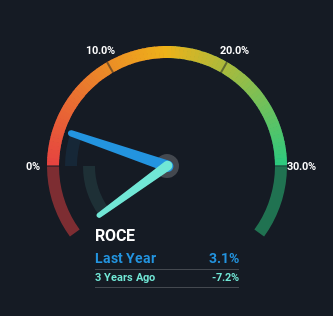- Hong Kong
- /
- Hospitality
- /
- SEHK:1128
Wynn Macau's (HKG:1128) Returns On Capital Not Reflecting Well On The Business
If we're looking to avoid a business that is in decline, what are the trends that can warn us ahead of time? More often than not, we'll see a declining return on capital employed (ROCE) and a declining amount of capital employed. This indicates the company is producing less profit from its investments and its total assets are decreasing. Having said that, after a brief look, Wynn Macau (HKG:1128) we aren't filled with optimism, but let's investigate further.
Return On Capital Employed (ROCE): What Is It?
For those that aren't sure what ROCE is, it measures the amount of pre-tax profits a company can generate from the capital employed in its business. The formula for this calculation on Wynn Macau is:
Return on Capital Employed = Earnings Before Interest and Tax (EBIT) ÷ (Total Assets - Current Liabilities)
0.031 = US$150m ÷ (US$5.5b - US$722m) (Based on the trailing twelve months to September 2023).
So, Wynn Macau has an ROCE of 3.1%. On its own, that's a low figure but it's around the 3.5% average generated by the Hospitality industry.
Check out our latest analysis for Wynn Macau

In the above chart we have measured Wynn Macau's prior ROCE against its prior performance, but the future is arguably more important. If you'd like, you can check out the forecasts from the analysts covering Wynn Macau here for free.
How Are Returns Trending?
There is reason to be cautious about Wynn Macau, given the returns are trending downwards. About five years ago, returns on capital were 23%, however they're now substantially lower than that as we saw above. On top of that, it's worth noting that the amount of capital employed within the business has remained relatively steady. This combination can be indicative of a mature business that still has areas to deploy capital, but the returns received aren't as high due potentially to new competition or smaller margins. So because these trends aren't typically conducive to creating a multi-bagger, we wouldn't hold our breath on Wynn Macau becoming one if things continue as they have.
On a side note, Wynn Macau has done well to pay down its current liabilities to 13% of total assets. That could partly explain why the ROCE has dropped. What's more, this can reduce some aspects of risk to the business because now the company's suppliers or short-term creditors are funding less of its operations. Since the business is basically funding more of its operations with it's own money, you could argue this has made the business less efficient at generating ROCE.
The Bottom Line
In summary, it's unfortunate that Wynn Macau is generating lower returns from the same amount of capital. Long term shareholders who've owned the stock over the last five years have experienced a 66% depreciation in their investment, so it appears the market might not like these trends either. That being the case, unless the underlying trends revert to a more positive trajectory, we'd consider looking elsewhere.
If you want to know some of the risks facing Wynn Macau we've found 3 warning signs (2 are significant!) that you should be aware of before investing here.
While Wynn Macau isn't earning the highest return, check out this free list of companies that are earning high returns on equity with solid balance sheets.
Valuation is complex, but we're here to simplify it.
Discover if Wynn Macau might be undervalued or overvalued with our detailed analysis, featuring fair value estimates, potential risks, dividends, insider trades, and its financial condition.
Access Free AnalysisHave feedback on this article? Concerned about the content? Get in touch with us directly. Alternatively, email editorial-team (at) simplywallst.com.
This article by Simply Wall St is general in nature. We provide commentary based on historical data and analyst forecasts only using an unbiased methodology and our articles are not intended to be financial advice. It does not constitute a recommendation to buy or sell any stock, and does not take account of your objectives, or your financial situation. We aim to bring you long-term focused analysis driven by fundamental data. Note that our analysis may not factor in the latest price-sensitive company announcements or qualitative material. Simply Wall St has no position in any stocks mentioned.
About SEHK:1128
Wynn Macau
Owns, develops, and operates integrated destination casino resorts in the People’s Republic of China.
Moderate growth potential with low risk.
Similar Companies
Market Insights
Community Narratives



